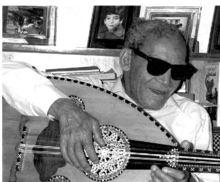Sheikh Imam
Imam Mohammad Ahmad Eissa or Sheikh Imam (Arabic: إمام محمد أحمد عيسى) (July 2, 1918 – June 7, 1995) was a famous Egyptian composer and singer. For most of his life, he formed a duo with the famous Egyptian colloquial poet Ahmed Fouad Negm. Together, they were known for their political songs in favor of the poor and the working classes.
Sheikh Imam | |
|---|---|
 | |
| Background information | |
| Born | July 2, 1918 |
| Origin | Giza, Egypt |
| Died | June 7, 1995 (aged 76) Egypt |
| Genres | Egyptian music |
| Occupation(s) | Singer |
| Instruments | Vocals, oud |
Life and career
Imam was born to a poor family in the Egyptian village of Abul Numrus in Giza. He lost his sight when he was a child. At the age of five he joined a recitation class, where he memorized the Qur’an. He later moved to Cairo to study where he led a dervish life. In Cairo, Imam met Sheikh Darwish el-Hareery, a prominent musical figure at that time, who taught him the basics of music and muwashshah singing. He then worked with the Egyptian composer Zakariyya Ahmad. At that time, he expressed interest in Egyptian folk songs especially those by Sayed Darwish and Abdou el-Hamouly. He also performed at weddings and birthdays.
In 1962 he met the Egyptian poet Ahmed Fouad Negm. For many years, they formed a duo composing and singing political songs, mostly in favor of the poor oppressed classes and indicting the ruling classes. Though their songs were banned on Egyptian Radio and Television stations, they were popular among ordinary people in the 1960s and 1970s. Their revolutionary songs criticizing the government after the 1967 war led them to imprisonment and detention several times. In the mid 80s Imam performed several concerts in France, Britain, Lebanon, Tunisia, Libya and Algeria. Later Imam and Negm broke up after several disagreements. Imam died at the age of 76 after a long illness.
Famous songs
- "Masr Ya Bahia" ("Pretty Egypt").
- "Guevara mat" ("Che Guevara is dead).
- "el-Fellahin" ("The Fellahin").
- 'Ye'eesh ahl balady" ("Long live the people of my country").
- "Sharaft ya Nixon baba" ("It's Been an Honor, Father Nixon" (sarcastic))
- "An mawdou' el-foul w el-lahma"("On the Subject of fūl and meat").
- "Baqaret Haha" ("Haha's Cow").
- "Valery Giscar d'Estan" ("Valéry Giscard d'Estaing")
- "Sign el-alaa" ("Citadel prison").
- "Sabah el-khaer ya Tehran" ("Good morning Tehran").
- "Gaezat Nobel" ("Nobel Prize").
- "Ghabah kilabha Diabah" ("The Wilderness Whose Dogs are Wolves").
- "Ya Masr Koumy" ("Masr (Egypt), Wake up").
- "Eza el-shams gher'et" ("When the sun drowns").
- "Shayed osourak 'al Mazare'" ("Erect your palaces on the farms").
- "Ana-sh-sha'bi maashi wa 'aarif taree'i" ("We are the people, we are marching and we know our path").
References
- "Songs from a prison cell". Le Monde diplomatique. Retrieved September 25, 2006.
- Imam at his 16th anniversary